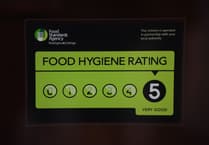Bluetongue virus (BTV-3) has been confirmed at two more farms in Powys, Welsh Government announced this week.
The cases were identified on Tuesday (September 30) near Llangammarch Wells and Gladestry. A single cow tested positive on each premises and will be culled in line with the national disease control strategy.
It follows confirmation last Friday (September 26) of Bluetongue in a suckler cow near Chepstow, Monmouthshire. Further testing has since shown active midge-borne transmission of the disease on that farm, prompting the declaration of a Bluetongue Temporary Control Zone (TCZ) in the surrounding area from Wednesday (1 October).
Chief Veterinary Officer for Wales Richard Irvine said the control zone was essential to limit the spread of the disease.
“We have put in place this temporary control zone to help prevent the spread of Bluetongue in Wales. This is because we have clear evidence of active midge-borne transmission of BTV-3 infection following further investigations at the affected farm near Chepstow, Monmouthshire,” he said.
“I urge animal keepers to continue to be vigilant for the signs of the disease, source stock responsibly and report any suspect cases to the APHA immediately.
“Vaccination is the best way to protect livestock and livelihoods from the worst impacts of this potentially devastating disease. If you’re an animal keeper I would urge you to discuss Bluetongue vaccination with your vet now.”
This brings the number of confirmed Bluetongue cases in Powys to three, following last Friday’s case in Presteigne.
Deputy First Minister and Cabinet Secretary for Rural Affair Huw Irranca-Davies, said: “Welsh Government and industry have cooperated throughout this year to keep Bluetongue out of Wales for as long as possible.
“Our success to this point has been crucial in buying our farmers the time they needed to vaccinate their animals and prepare for Bluetongue. Everyone needs to now play their part and help manage where Bluetongue disease is appearing. We must continue to work hard together to protect our Welsh livestock sectors from this potentially devastating disease.”
Gerwyn Williams, FUW Animal Health and Welfare committee chair commented: “It is disappointing that bluetongue virus has now reached Wales. While there is no treatment for this infection, vaccines are available and it is strongly advised that farmers discuss vaccination options with their vet.
“Knowing what to look for is essential. Animals infected with Bluetongue become lethargic and develop crusting and erosions around their nostrils. There may also be drooling and swelling around the head and hooves. Both cattle and sheep may show an increase in abortions, foetal deformities and still births.
“As an industry, we need to be mindful when sourcing our livestock, understanding that the virus is spread by midges but can also be transmitted through infected semen, embryos and by the movement of infected animals.”
Bluetongue virus affects cattle, sheep and other ruminants, and is spread by biting midges. While the disease poses no risk to humans or food safety, it can have serious consequences for livestock health.
It is notifiable disease, so anyone suspecting their animals may have it must report it to the Animal and Plant Health Agency (APHA).





Comments
This article has no comments yet. Be the first to leave a comment.